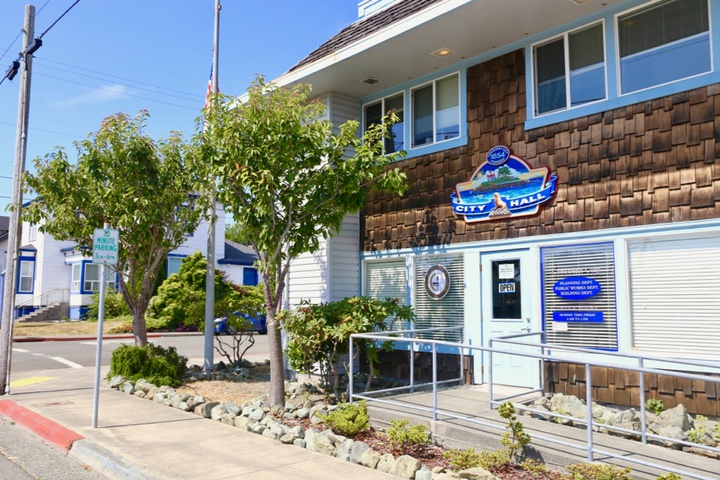Jessica Cejnar / Wednesday, Aug. 19, 2020 @ 1:21 p.m. / Infrastructure, Local Government
Crescent City Hopes Energy Projects Will Realize Enough Savings to Fund Improvements at New City Hall Building

Crescent City's current city hall building. Photo: Andrew Goff
Crescent City has entered the first phase of a project staff hope will lead to enough energy savings to pay for improvements to its new city hall.
Four members of the City Council approved a professional services agreement Monday with Johnson Controls for an energy audit and feasibility study. The goal for the Washington-based company is to determine projects that could make the city’s water and sewer systems, along with facilities and operations paid for out of its general fund, more energy efficient.
“The goal of this project is to capture enough positive cashflow to fund necessary improvements to the new city hall building,” said Brian Labrie, an account executive with Johnson Controls. “This way the city can have a new city hall funded by sustainability and resiliency measures.”
Crescent City had purchased the old Bank of America Building at 2nd and H streets in 2018 with the goal of turning it into city hall. However, due to budget deficits brought on by COVID-19, the city had to put the engineering and architectural design of the new building on hold.
In addition to approving the professional services agreement Monday, Crescent City Mayor Blake Inscore also appointed himself and Councilor Isaiah Wright to an ad-hoc committee that would be involved in project discussions. Inscore noted that he wanted to make sure to include “two of us we know will continue on through the next two years to be part of this” since Councilor Jason Greenough is seeking re-election this year.
Councilors Alex Fallman, who was absent Monday, and Mayor Pro Tem Heidi Kime are not seeking re-election.
The feasibility study and energy audit will be the first phase of a three-phase process. In the second phase, Johnson Controls will deliver a project development agreement to the City Council. If the City Council chooses not to move forward with it would reimburse Johnson Controls for the engineering costs, which typically range from 1 to 3 percent of the project cost, according to Labrie.
Construction would begin in the third phase, Labrie said.
“We would implement measures identified in phases 1 and 2 while leveraging guaranteed savings with a guaranteed not-to-exceed price,” he said. “Some of the measures we will be evaluating include, but are not limited to, LED lighting, renewable energy, building automation controls, HVAC improvement, high-efficiency pumps and other efficiency measures across the water system and wastewater treatment plant.”
Crescent City Manager Eric Wier noted that the projects presented to the City Council will be separated between its general fund and water and sewer enterprise funds.
“We might have a sewer project, we might have a water project and we might have a general project,” he said.
According to Public Works Director Jon Olson, the cost of the projects could be up to $8.5 million. If the city chooses not to move forward with the projects, it would have to reimburse Johnson Controls up to $255,000, he said.
According to Crescent City Finance Director Linda Leaver, the idea is for Johnson Controls to come up with a number of projects that would save the city enough money to pay for the improvements.
“We don’t know what those projects are going to be, but we’re estimating the projects’ (costs) could be somewhere in the neighborhood of $8 million,” she said. “The idea is we can do the improvements and then the savings we have over the life of those improvements would be enough to pay for the improvements or more.”
The idea to look for energy efficiencies and savings for the city came during the fiscal year 2019-20 budget workshop, according Olson. The proposal from Johnson Controls was one of eight the city received, he said.
City staff teamed up with Crescent City Harbormaster Charlie Helms and Del Norte Community Development Director Heidi Kunstal to evaluate the proposals, Olson said.
According to Tim Clark, Johnson Controls’ lead development engineer, the feasibility study and audit will include site inspections, data collection and a series of workshops with city staff to identify the opportunities and measures to be included in the future project.
The company has already conducted a preliminary analysis of the city’s utility bills and plans to do a more thorough analysis, Clark said.
“And then we’ll compile that into a preliminary business case analysis with some cost and savings calculations and estimates,” he said. “We’ll identify rebates or incentives, usually financing incentives that we want to include options for and we’ll work with staff on those.”
According to Labrie, the end of Phase 1 will come in late October.
The Council voted on the professional services agreement with Johnson Controls after Leaver gave an update on the general fund.
Though the projected general fund balance has been adjusted upward from $310,000 to $500,000 roughly, the city is still experiencing a deficit of about $594,000, according to Wier.
CLICK TO MANAGE